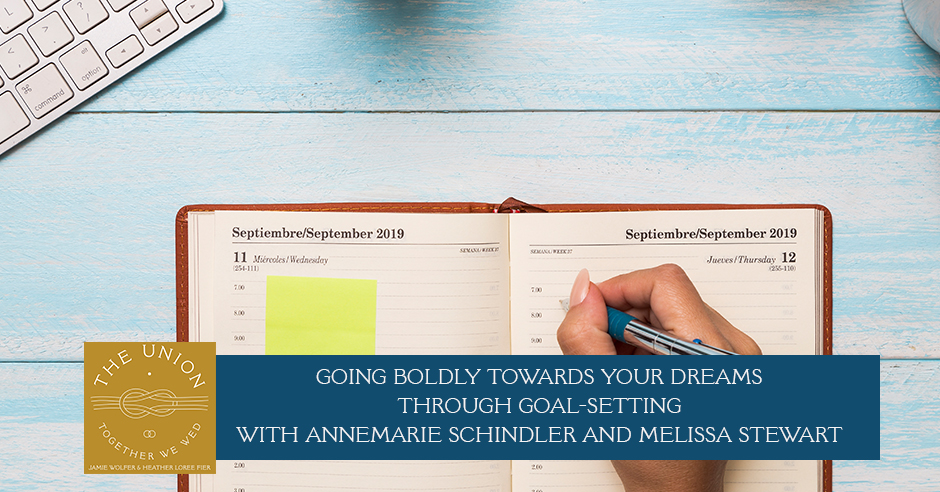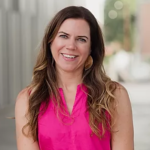
Life is not without challenges, even more felt when you have something to reach for. Here to tell us how they help individuals and organizations achieve what matters most through goal setting are AnneMarie Schindler and Melissa Stewart, co-founders of Ivy.Ly Co. Starting with their own share of overcoming challenges and tackling goals, AnneMarie and Melissa talk about their entrepreneurial journeys that started from an unlikely place—the public collapse of a very successful and impactful nonprofit. Amidst the chaos, they planned their own weddings and took on new challenges as entrepreneurs. These ladies have leveraged the power of intentional goal setting, accountability, and community to achieve dreams in their lives. Just in time for the new year, take in all the goal-setting advice and wisdom from AnneMarie and Melissa and have a fresh start this new decade as you go boldly towards your dreams.
—
Listen to the podcast here:
Important Links:
About AnneMarie Schindler
 I’ve blended my business school background with years of experience as an entrepreneur and a constituent-focused professional. As a result, my approach is often measured, collaborative, and effectively delivered.
I’ve blended my business school background with years of experience as an entrepreneur and a constituent-focused professional. As a result, my approach is often measured, collaborative, and effectively delivered.
My ability to pivot between strategic and operational thinking, as well as build highly-effective teams by assessing personnel strengths and maximizing resources has made me successful as a people manager and as a consultant. I value honest communication, the space to lead authentically, and an appreciation for analysis and continuous improvement.
About Melissa Stewart
 I’m a driven, strategic, innovative leader with proven success in creating and implementing programs and services, and building effective teams, productive partnerships, policies and procedures. My experience developing standard operating procedures, quality assurance measures and software systems, have allowed me to evaluate and enhance program effectiveness.
I’m a driven, strategic, innovative leader with proven success in creating and implementing programs and services, and building effective teams, productive partnerships, policies and procedures. My experience developing standard operating procedures, quality assurance measures and software systems, have allowed me to evaluate and enhance program effectiveness.
As a licensed social worker, I excel at collaborative communication. My fine-tuned ability to relate to others allows me to cultivate and develop strong working relationships with both individuals and teams.
Going Boldly Towards Your Dreams Through Goal-Setting With AnneMarie Schindler And Melissa Stewart
Jamie: We are going to be talking all about goal setting, whether you are in the process of starting a business, in the throes of running a business, or even planning your wedding. For me and Heather, we need help with our goals just as much as you do. We have AnneMarie and Melissa from Ivy.ly. They are going to be sharing some of their best advice for how we can set goals and achieve them. That’s a scary sentence to say out loud, but we’re here and we’re going to do it together.
—
Heather: We have AnneMarie and Melissa from Ivy.ly to talk to you about goal setting. They’re not just talking to you about some pie in the sky goal setting from this idealistic perspective of life being all beautiful flowers, sparkly rainbows and setting some awesome goals. They’ve actually started their business and gone through some crazy stuff that led to this, where they were learning from tough experiences. They’re bringing in life and all of us have that, so it’s an inspirational thing to learn from them.
AnneMarie: Thanks for having us. I’m happy to share this. I’m super excited about it.
Jamie: Both of these ladies, I was introduced to by my lovely sister, Bree, who worked at The LIVESTRONG Foundation. For those of you who don’t remember, Lance Armstrong threw a wrinkle in the Livestrong Organization’s plans when everything hit the fan for him personally, and pulled that organization into that. These ladies were there, saw some of this fallout and actually managed to learn and grow from it. I want to talk to them about that. Let’s jump into it. AnneMarie, can you tell us about how you started your entrepreneurial journey?
AnneMarie: It was a wild ride definitely. I started working at Livestrong in 2008 and saw a lot of growth, scale and a number of wonderful opportunities. As you alluded to, in 2013, things changed drastically for the 100 employees that were at the organization at the time. I managed a significant team and I felt like it was my chance to see through some difficult times. I learned a lot about change management, team management and organizational management as things began to shift, downsize and reprioritize. I kept that lens for two more years as I stayed on to see the organization through some significant changes and downsizing until I decided to depart.
A few years later, I went out on my own and started a nonprofit consulting firm where I teamed up with Melissa on projects from time to time. I enjoyed working with her and having a partner to bounce ideas off of. We quickly became fast friends and started doing goal setting, personally, around 2016. Ivy.ly was a manifestation of our personal and professional lives weaving together and blending into a strategic goal setting company. We help individuals and organizations set goals and then follow a path of achieving what matters most to them.
Jamie: Melissa, I know you’re coming from the same place. You are there seeing all this craziness happen. You also went and launched yourself into entrepreneurship from this company collapse. Can you tell us about your journey?
Your values as a person can should also translate into the values of who you are in the workplace. Click To TweetMelissa: I always like to say that I have a background in social work. I have my Master’s degree in Social Work, so relationship building, connecting with people and getting to learn where everyone is coming from has always been important to me. I also grew up on the East Coast but closer to the Washington, DC area. I worked in fairly traditional job settings, primarily in the nonprofit space where I had a chance to meet AnneMarie and Bree and other amazing people at the Livestrong Foundation.
I’ve enjoyed having a side hustle. I don’t always love that word, but I always like having projects I’m working on the side. My husband and I started a music festival in Austin. One of many since Austin has a plethora of them. For about three years, we ran a music festival with several friends. That had its ups and downs, but it taught me so much about risk-taking, trying things and understanding that goal setting isn’t always about achieving. It’s also about knowing when to walk away from things. We did walk away from that.
I’ve been in Austin for more than fifteen years. Similar to AnneMarie, when I left the Livestrong Foundation, I started my nonprofit consulting firm primarily working with nonprofits to help them a lot around organizational and operational planning. The consulting side of my life and what I’ve been doing since 2014 is helping organizations set and achieve their goals at a professional level. As AnneMarie said, she and I organically started meeting and talking about our own goals and our personal and professional lives. It was so great to talk to someone who I felt like not only could relate to me in going through similar things with starting our businesses but also building that friendship and learning along the way.
Jamie: I have a question. I don’t want you guys to be offended by this. Hopefully, not. Given the storm that happened at Livestrong, were you guys leaving to start your entrepreneurial journeys because of that or did that line up and it was unrelated? There’s something interesting coming from a situation where maybe things aren’t in a great place in someone’s life and things seem like a bad situation, but you’re able to set goals, move and grow from it. I wonder if there’s something there we could discuss if you’re open to it. I don’t want to bring up a bad topic or if Livestrong probably had you banned from talking about it.
Melissa: I appreciate you saying it because I think sometimes people don’t want to acknowledge some of those challenges in the past. I will say a couple of things about it. One is that I started with Livestrong in 2005. I had the benefit of being there when times were amazing. I was there for about nine years. I always say, and I still say it now, you can’t take the good without the bad. I benefited from what was an amazing place to work that had an entrepreneurial spirit about it.
Honestly, when I was looking to leave the foundation, I couldn’t find the workplace or environment in a nonprofit setting. Not to say it doesn’t exist, but it had become so ingrained in me to be creative and Livestrong nurtured that. That became part of my ethos of what was important to me in a workplace setting. My husband likes to take a lot of credit because when I left the foundation, he was like, “You’d be so good at consulting.” I said, “I don’t know. I’m not sure.” Now, he likes to say, “See? I told you.”
What honestly stops us from crushing our goals is us. Click To TweetIt’s a little bit of both. I left because I was ready to leave. In all honesty, I was looking to leave before things got terrible and bad. I stuck around for a little while. When I left, I spent time making a list of what was important to me in terms of the next aspect of my career. Having that ability to be creative and having that entrepreneurial spirit was important to me. I don’t mind structure at all. I love rules but I like to create them myself. Livestrong allowed that. That became part of what I was seeking out in the next part of my career. Do you have a different answer, AnneMarie?
AnneMarie: I think that Livestrong gave many of us the launchpad to do things that may not have been possible as quickly as other people thought it would be at that point in our career. I know that for myself, I intentionally stayed for two years after things hit the fan. I saw it as an opportunity to learn a lot in change management and team management during a time that was challenging. That makes us relatable and empathetic to people who are going through difficult professional changes or are at a place within their organization or professional life that they’re like, “I just don’t know.” I remember going to work quite a few days and seeing it out, but not having the ambition to look elsewhere to change. We are understanding of people pursuing different levels of goals across their life domains. We’ve been in places that were either super great and we were setting a lot of goals or places that we felt a little bit more on autopilot.
Heather: I don’t know what happened with Livestrong. I know something went down, but I don’t know any details. They may not be pertinent at all but I’d like to know before we get started.
Jamie: You guys know the inside of it more than I do.
AnneMarie: I’ll say it from a side perspective. Livestrong was a nonprofit that, in its heyday, was a $50 million organization. In the grand scheme of things, less than 10% of nonprofits in the United States ever get to that scale. There were partners like Nike, RadioShack and Oakley. All of this support allowed it to operate a lot more like a for-profit business. After Lance Armstrong came out and admitted to using performance-enhancing drugs in January of 2013, the bottom fell out of that organization. It continued to fall out for years after that to the point where the organization is worth maybe $5 million.
Jamie: I think they folded it into the University of Texas into their cancer research. At least, that’s the last thing I remember hearing from my sister.

Power Of Goal-Setting: Anyone who’s ever worked in a nonprofit space understand that you are usually there because you have some connection to the mission.
Melissa: They still have their own independent nonprofit that has about a dozen employees and has a couple of millions of dollars a year. A huge aspect of what they’ve done is to fund the Cancer Research Institute at the University of Texas. The biggest piece of it is having a founder be a celebrity figure that then had an extreme public downfall. Many of those sponsors that AnneMarie mentioned were not only sponsors of the organization, but were his sponsors. Obviously, them pulling out of sponsoring him slowly but eventually removed their funding from the foundation. It became hard for the public to see the foundation separated from Lance. Lance was asked to leave the organization. He was still on the board. Whether that was the right or wrong decision, it’s outside of my decision-making. The public couldn’t untwine that Lance had done this thing and he was associated with this organization. The organization must have known, been involved, or somehow isn’t right either.
Heather: I wasn’t living that much under a rock. I was aware that happened with Lance. For some reason, my brain didn’t think it had an effect on the nonprofit. I’m like, “Did something go down with a nonprofit too?”
Melissa: No, nothing. You would think, but that was exactly that. That was what was hard for those of us who worked there. We’re like, “We’ve been doing work all along. We’re doing good and hard work.” Your ego gets a little wrapped up in that too. Similar to AnneMarie, I had been there since 2005 and had seen a lot of ups and downs. I managed a large team of about sixteen people, which was a significant portion of the team there. When things started to get challenging, we had to make cutbacks and changes. It feels personal at a nonprofit. Anyone who’s ever worked in a nonprofit, please understand that you are usually there because you have some connection to the mission. Many of us who worked there had a personal connection to cancer or were cancer survivors.
It’s humbling not only to have to scale back your goals but also to feel like you’re not serving and supporting the people that you thought that you were going to be able to serve and support that year. There’s something else about that feeling like you’ve disappointed people, which is hard. We tried to spend a lot of time honoring and acknowledging that. That translates to anytime you are goal setting, whether it’s for starting a new business or for wedding planning. I should clarify that both AnneMarie and I got married, separately, not to each other, the same year that things got challenging. I remember the weekend of my wedding was when Lance was asked to leave the board of the foundation. On top of dealing with the challenges of the organization, we were also simultaneously planning our respective weddings. There was a lot here in both those areas.
It's not about the quantity of goals you have but the quality of really understanding why they are something you want to work towards. Click To TweetWhen I left the organization, I felt grateful for the network of Livestrong. That goes to show that even when an organization may be changing, have challenges, whether they’re welcome or not, the relationships of the people that you have around you can help support you for the rest of your life. That, to me, is something that I learned in starting my own business. It’s being comfortable asking for help, talking to people about what I need and what I don’t understand.
There are more than 100 books out there that can tell you how to start a business, but they’re not starting your business. They don’t know your life. Surrounding yourself with people who are supportive and can help elevate you is something that I learned early on. It’s also asking a lot of questions. I felt lucky that I could get to benefit from those aspects of Livestrong as I started my entrepreneurial side of things. I could build off of not only what I learned there as a person but then leverage those relationships.
Heather: You both remind me of a phoenix rising from the flames of this craziness in your career. That had to have been so stressful. As you’re planning weddings, you go, “Let’s go start our own businesses.” It’s amazing that you were able to do that. It seems like you guys were empowered from watching things go poorly and go, “We can learn from this. We can see what we can do better, what we can take from this, and the social capital we built up to roll into some new projects.” Kudos to you guys. That’s amazing. Coming from a complete outsider’s perspective, I knew the two were intertwined but I didn’t realize how much it had impacted this nonprofit. I’m learning so much. I already have a full page of notes. If you can, ladies, Melissa first, what is it exactly that you guys do?
Melissa: Independently, we both started our own respective nonprofit consulting businesses where we have primarily worked consulting with nonprofits. AnneMarie is more on the development and event management side and myself more on the program development side. As I referenced earlier, the network is so impressive and powerful. When we both started our businesses, we naturally started meeting on a regular basis. We were picking each other’s brains, learning from each other, recommending what accountant to use and what software to use for business tracking. That happened organically.
We started teaming up on different projects where it made sense. We’d been doing that for about four years and we simultaneously started talking about our personal goals. In this day and age, it’s hard to separate personal and professional goals and lives. It’s not to say you shouldn’t have boundaries. We live in a world where your values as a person can and frankly should translate into your values of who you are in the workplace.
Trying something new requires you to be really vulnerable, and that's harder and harder as we get older. Click To TweetWe started having conversations about different goals that we had. We would set up a meeting on a quarterly basis, sometimes over a drink or coffee, depending on the time of day. We’d talk about what we were working towards. Sometimes, I would ask AnneMarie for advice, suggestions or ideas and vice versa. She introduced me to the Mind Mapping exercise, which is a great visualization exercise around goal setting.
What we decided to do was to take what we’ve been doing organically, which is around goal setting and visualizing the things that we wanted to achieve in our lives, and turn it into a business. We’ve loved doing it with each other. We saw the benefits of writing down your goals and having that accountability of a person to talk to about it. Someone who’s going to hold you to the fire and say, “I thought you were going to work on that?” Hold you to the fire and say, “Maybe that’s not right, right now.” It’s great to have someone to be able to talk to about that.
Ivy.ly is the birth of what we’ve been doing organically in goal setting. It’s a way for us to work not only with companies, which we had been doing individually but can now do together and helping them set goals but also individuals. Maybe they have a big year coming up because they are planning a wedding. They’re trying to understand how they can get it all done on top of working a job, taking care of their family and living life. We can help people with goal setting. We have also built a goal-setting planner. It’s a physical product where we believe that you can document, track and manage your goals on a yearly, monthly, weekly and daily basis to help maximize your effectiveness in achieving your goals. Ivy.ly is a combination of not only our professional backgrounds but also our values when it comes to goal setting.
Jamie: I’ve got a spare bedroom if you want to come move in, be my motivational speaker and help me with everything in life. That sounds great.
Heather: That accountability would be helpful. I can see that everybody could use this. Who doesn’t need help achieving their goals?
Jamie: One of my favorite things that you said, Melissa, was calling you out when you’re setting a goal that’s not achievable. Maybe it’s too big, needs to be broken down or shifted slightly. That accountability is powerful. What do you guys think makes goal setting powerful? Why is this important for people to be doing?

Power Of Goal-Setting: Even when an organization may be changing, the relationships of the people that you have around can help support you for the rest of your life.
AnneMarie: Whenever we approach the New Year, I feel like everyone is thinking like, “Should or shouldn’t I set goals?” I read an article that said 25% of people abandon their New Year’s resolutions in seven days. I thought that’s tragic. Goal setting is supposed to be something that is motivating and inspiring you. It’s based on what you want out of your life. The process of goal setting needs to be a collaborative process. It’s not necessarily with somebody setting the goals for you, but you sharing your goals with somebody. As you write them down and speak them out, someone else is excited to share those with you. They’re excited to support you and celebrate you when you get there.
Jamie: What a powerful way of putting that, because that’s true. I think about what I share with my spouse, like the goals that I have or things that I want to achieve. Having someone there to celebrate that with me makes it feel more real. Instead of checking it off a box, I’m verbalizing it. I’m saying it out loud to someone and sure. He’s not super enthusiastic sometimes. There’s power in being able to share those details, hold you accountable and encourage you. It’s not just like, “Have you got it done yet?” To celebrate with you once it’s done is such a helpful element.
Heather: Everyone can use this even if you’re the most motivated, on-fire person. If you are Rachel Hollis and you kill it every day, you still need someone to be there to set the goals and to check in on you. I know I’ve heard her talk on their podcasts about Dave Hollis doing this. I know that they work together as a team because you need that accountability.
Jamie: Melissa, what do you think is stopping us from crushing our goals? What gets in the way of that?
Melissa: I think it’s a couple of things. First and foremost, we live in a society where we are bombarded with ideas, information, best practices and top ten lists. Believe me, I’m a sucker for all that too. We’re always looking for a quick fix. We’re always looking for like, “This list is going to help me figure out how to do X, Y and Z better.” We don’t often spend time reflecting internally and saying, “Why are these things important to me?” What stops us from crushing our goals is us. It’s not about the quantity of goals you have. It’s about the quality of them and understanding that like, “Why is this something that I want to work towards?”
The small steps add up to the big win of being able to identify your venue. Click To TweetIt’s understanding that it could take time to work towards my goals. It’s understanding that it requires a level of vulnerability. We’ve already talked about wanting to share those goals with someone and wanting to try something new. I don’t know about you but I don’t always like trying new things because I like doing things that I’m already good at. Trying something new requires you to be vulnerable. That’s harder and harder as we get older, especially in a society like Instagram where we only want to promote the things that are going well.
We believe in our values that we instill in Ivy.ly and that I believe in. There are three things. Having the focus to know what’s truly important to you. Sometimes, it takes discipline to focus on what’s most important to you. It doesn’t mean that my focus is what’s most important to someone else. It’s what’s most important to me. Having the courage, the vulnerability, to believe that I can accomplish my dreams. Being kind to myself. I’m not always going to do it right. I may have a step back or change my mind, and that is okay. Not to sound cliché but usually, we’re our own worst enemy. Trying to practice those three principles of focus, courage and kindness, and asking yourself these questions every time you’re setting, reflecting and changing a goal makes you think about them.
Jamie: Focus, courage and kindness, I like that. I see how that can definitely help you with setting the right goals and being very self-aware that this is a goal that matters to you. What can you do to keep on course and to have the right habits to achieve your goals?
Melissa: AnneMarie was talking about in some of the research, it shows that you are more likely to achieve your goals if you’re writing them down. It’s only the accountability of telling someone, but putting pen to paper. We live in a digital society but our brains are so wired to retain things better when we write them down. I’m not making this up. There is research that shows it. The literal process of writing down your goals. Set aside time, ideally monthly, if not more frequently, to review those goals and say, “What have I done to work towards them?”
Say your goal is to identify your wedding venue by the end of March if you’re getting married in the fall. What are the steps that you need to get there? You don’t suddenly wake up and you’ve identified it. There are multiple steps involved in that. You need to do research. Maybe you want to talk to people. You’d want to understand how many people you’re going to have at the wedding, so you know what size venue to look for. Depending on the time of year, do you want something that has indoor or outdoor space? It’s taking your goal and starting to think of all the steps to reach that goal. You don’t need to get all those steps done in one day or one week. What are the few steps that you can take so that you feel like, and frankly you are, making progress? Those small steps add up to the big win of being able to identify your venue. Writing it down is hugely important.
Heather: I had someone comment on a YouTube video where she said, “How do I beat procrastination? I’m so overwhelmed with everything that I need to do that I ended up not doing anything. After that, I get more overwhelmed.” I said, “Break it down into bite-sized pieces and then celebrate each step.” I’m hearing to write it down. That’s something my mom always did. My mom is a list-maker that’s above normal list-makers. If she gets something done that’s not on her list, she will write it down just so she can cross it off. She’d casually leave it on the counter just so someone would walk by and be like, “You’ve got so much done today.” She’d flip her hair and be like, “Yes, I did. Look at my list.” Writing it down and having the bite-sized pieces and crossing them off, there’s victory in that even if they’re tiny. Breaking down what it looks like to search for a venue or finding your guest list, and then celebrating when you cross each and every one of those off is a big deal.
Sometimes, the people that we have surrounding us are just not ready to support us in a new stage of our life. Click To TweetHeather: I may procrastinate sometimes. It’s life, it happens. The emotions get more overwhelming. They get bigger and bigger. It’s not like it gets easier to do as time goes on. It gets scarier and more stressful. Procrastination doesn’t seem to help at all. It makes it worse. I know that sharing goals is important, and you guys have spoken about that a couple of times. How do we handle when those around us seem to sabotage our goals, whether intentionally or unintentionally? Whether they’re not being supportive, being a naysayer or outright saying, “No, you can’t do that?” AnneMarie, what are your thoughts on that?
AnneMarie: There are two ways to approach that. First, I’m a big believer in creating a shared understanding of why my goal is important to me. Oftentimes, I feel like people just see you wanting something different or big in your life and they’re nervous or scared for you. That comes out in the sabotaging behavior. Instead of trying to say, “This is what it means to me,” if I was able to do that thing or achieve this goal, how it would make me feel? What memories, achievements or personal satisfaction I would get out of doing it and bringing that person along the journey of why? It’s important to maybe change their mind or build their support in a different way.
We started talking about our goals organically because we were going through a lot of shared experiences. If you can find friends or colleagues who are in a similar position to you in their life or professional careers, they might be the new network of folks that you need in order to set goals and feel supported. Sometimes the people that we have surrounding us aren’t ready to support us in the new stage of our life, and that’s completely okay. We need to find other communities where we feel like they’re going to help us either get to that next goal or level. They can share their experiences and help us get there.
Heather: AnneMarie, my thought on this, I once dropped in at your CrossFit gym in Austin, where my sister had me do this workout I was not ready for and tried to kill me. Perhaps like that CrossFit Kool-Aid people drink that gets them so pumped up physically, but also pumped for life and to exceed goals they’re setting for themselves physically like that. That tribe mentality that develops there is something that helps people who can overcome. The relative is like, “You’re not going to lose the weight you want to lose.” Is that what you mean surrounding yourself with that support crew?
AnneMarie: Completely, whether it’s a one-person community or a five-person community. All you need is the confidence and belief backed by another person to start to feel momentum toward the goal that excites you and you’ll keep going.

Power Of Goal-Setting: The process of goal setting needs to be a collaborative process, sharing your goals with somebody so that someone else is excited to share those with you and to support you.
Heather: I can see that. When I hang out with my fit friends, I feel like I could do anything in the fitness world. I shouldn’t get that excited about it because I’m not doing that great. When I’m around them, I’m like, “I’m going to get into this. I’m going to do ten pull-ups by the end of the year.” I need to be consistent with that and I probably can. Being around those people who are going to encourage reaching those goals make such a big difference. I can see how that community is critical.
Jamie: It speaks so much to the power of networking and finding people that are in your same genre and going your same speed. I know for me, I have a couple of YouTube channels and I don’t know anyone else who has had them. For a long time, I was floundering on my own until I connected with another creator. The ability to commiserate with someone who understood what I was going through was powerful. Every once in a while, I’ll shoot her a text and be like, “I’m having this experience.” She goes, “Me too.” The power of having someone who can relate makes you feel better, more secure and you’re not crazy. When you share your goals with that person who understands your plight or struggles that you face, they’re able to celebrate with you more fully because they know what it feels like.
Heather: This is critical, especially for those who are on their wedding planning journey or planning weddings, working with couples and all these different things. They’re very stressful and unique. It’s a unique experience to be involved in the wedding industry. Having those people around you who can be like, “I understand. I get you. I see what you’re trying to achieve here. Let’s hold you accountable. Let’s get excited about this.”
Jamie: Can you walk us through an exercise to set up goals for this next year and maybe this next decade?
Melissa: As we’ve been talking about this whole time, it’s important that you understand who you are going into your goal setting. We’re in a world where we’re surrounded by ideas about other people, clothes we should buy, things we should wear and things we should care about. Ultimately, whatever your goals are, identify the values that you have that are important that are going to lead to your goal setting and decision making. Both spend time doing this every year. We always like to suggest looking at our core values and identifying three to five values that will help us filter our decision making throughout the year.
We talked about focus, courage and kindness, which are part of Ivy.ly. When you’re going to sit back and say, “I want to set my goals,” you want to think about, “What is it that’s important to me?” If it’s wedding planning, what’s important to me might be family. It might be good food. That might not be a value, but I would argue that it is a value. Being able to identify those pieces that are going to be important to you then help lead to your goal setting.
Once you’ve identified your values like creativity, honesty and good food, of course, how do you operationalize those and let those show up in a way? We like to think about setting goals in different domains in your life. We tend to grab a piece of paper and start to be creative. No one has to see this. You can take a piece of paper and write down the different domains of your life. It could be family, friends, travel, hobbies, children or career. A wedding could be its domain, especially during the time when you’re wedding planning. Write those all over the piece of paper.
You can start to draw connections between things that are important, keeping your values in mind. We call this mind mapping. It’s an idea of taking everything that’s in your mind and starting to visualize them in a way that shows you the connections of all the different areas. If you have travel, finances and career, how do you think about those aspects? If you’re talking about travel this year, “I want to go on my honeymoon and I want to blow it out of the water.” On travel, you’re like, “I need to save $15,000 or whatever it is to go to Bali.” It starts to get you to think about the different domains of your life, but also how they can support each other.
This idea of taking pen to paper to get you started, it doesn’t need to be anything pretty. No one needs to see it, especially not in its first pass. I do like to make another iteration that becomes my final piece. I like to put it up in my office where I’m going to see it every single day. It’s not, at that point, getting into the level of detail of setting the goals to achieve that, but it’s keeping those big-picture things in mind. We both approach goal settings starting with the big picture and then starting to narrow down from big picture to yearly, monthly, weekly and daily. The mind map becomes like a constellation of how all of your domains fit together. It’s pretty amazing when you visualize it and look at it. I looked at mine and went like, “How have I been doing this year?” I try to do that pretty often, maybe not as often as I would like. I’m like, “I haven’t even thought about that.” Taking that idea of creativity and starting a big picture helps us.
Heather: Everybody’s goals are going to be completely different as you go through different phases. If you’re an entrepreneur, maybe you’re launching a business and your goals are focused on financial, networking, and those sorts of things. A few years later, you’re in a phase where you’re starting a family and you’re not aiming as high financially, but more as a time freedom thing. We all have different waves and phases that we go through. It’s smart to actually consider what are those bigger, higher-level values. If you’re not looking at that, you can be setting goals that don’t align with what you want anyway. Just because everybody would want to throw up on a board and say, “I want to make $1 million this month,” but maybe that’s not what you want to do.
Jamie: As I’m getting older, I’m learning more about what my actual goals are. Sitting down and writing that down is important and valuable. I love putting pen to paper. I’m realizing that one of my goals is spending time with my family. If I don’t write that down on a piece of paper, I will continuously get nagged by this overwhelming mom and wife guilt of being like, “I’m neglecting the humans in my life again.” To write that down, stare at it, put it on my wall and realize, “Walk away. It doesn’t need to be done right now,” is one of my goals because I know it feeds me, feeds my family, and does well by me. That may not be the goal of someone else, especially if they don’t have a gaggle of children. Obviously, that wouldn’t be something that they would write down. The power of putting that down, putting it on your wall and staring at it must be encouraging and grounding all at the same time.
Heather: I think it’s critical. Being a new mom with a little baby, I’ve been having to find balance with my work and babying this baby. I’ve been waking up at 4:00 AM, feeding her and then I’m like, “I guess now is my time to work because she won’t be bothering me for a few hours while she still sleeps.” That’s how I’m finding balance and knowing that my goals are to continue to keep the business going. That’s why I’m also getting to spend the majority of my day time hours with her. That’s my goal. That’s for now, working. Maybe in six months or a year, things will change. Having that in mind helps alleviate some of that guilt that you can feel where if you are unclear of what you want to focus on, it feels like you’re always missing out on something. I love what you guys are doing at Ivy.ly. Can you tell us a little more about where people can find you guys, about these planners, anything that they can do if they want to get their goal-setting mojo going?
Melissa: We would love to share the mind map template and core value template with you if you wanted to link it for people to get off to the races themselves. If they wanted to explore getting into a more detailed system with the planner, they can go to IvyLyCo.com. That has all of our work as well as some events that we’re doing in Austin if they’re ever down this way in Texas.
Heather: I’m excited for everybody to get to do this mind map. I want to do this mind map right away. I know I’m going to be making one of these to put on my wall in the office here. Thank you, guys, for being here with us to share some great wisdom so people can get clear on what they’re wanting and then keep checking in, keep adjusting as they go. Jamie, do you have anything else you wanted to say to close this out?
Jamie: I cannot wait to get my grubby little hands on one of those mind mapping things because I’m pumped. I’m so excited. Thank you so much for sharing that with us.
Melissa: Thank you for taking the time to talk to us.
Heather: Thank you for joining us. We hope you are on fire and want to get your goals going. Go out there and crush it.





